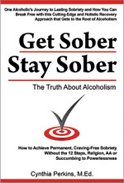Is Alcoholism a Disease?
The "is alcoholism a disease" concept is one that is not fully understood by many. Even within the field of treatment there is not agreement on this issue and controversy abounds, which only complicates matters worse and fuels confusion.
Within the recovery community they often refer to their addiction as a disease, but most people have no idea what this means or why it's important.
Although I actually prefer the word "disorder," because I think that is a more accurate word for what is going on, it is my position that viewing alcoholism as a disease is the most accurate, productive, and effective way to approach recovery. Therefore, we are going to examine the alcoholism disease concept a little further.
Science has taught us a great deal about alcoholism and addiction over the years and what we know for sure is that addiction to alcohol or any substance is not the result of character defects, weak will, sin, lack of honesty, spiritual or moral failings, personality or psychological disorders, or the lack of a higher power.
Why is Alcoholism a Disease?
Inside our brain we have neurons, neurotransmitters, receptors and transporters that work as the communication system of the mind and body and are responsible for all thoughts, feelings and actions. Neurotransmitters are natural chemicals used to convey messages within this system.
Within this network are a variety of pathways. One of the primary pathways involved in this process is the reward pathway, also known as the pleasure pathway or dopamine pathway, and the neurotransmitter used in this pathway is dopamine. It is responsible for stimulating feelings of pleasure that motivate us to engage in behaviors that are necessary for our survival, such as eating, drinking water, nurturing, procreating.
For example, when you eat or have sex, which are both essential activities for survival of the species, the brain releases a little surge of dopamine to make you feel pleasure to reinforce that you will repeat this behavior.
Alcohol and drugs are chemicals that interfere in the communication system. They overstimulate the neurotransmitter dopamine. Instead of a little surge pleasure, they stimulate an excessively high amount of dopamine, which produces the intense feeling of euphoria. The brain is hardwired to repeat activities which ensure survival, so when alcohol or drugs enter the system, the brain is essentially tricked into believing it should keep doing this activity, since the reward pathway is activated.
However, when excessive amounts of dopamine are released the brain says "hey that's too much dopamine," and responds to this excessive stimulation by reducing the number of dopamine receptors and thus more alcohol or drugs are needed to experience the euphoria. This is called tolerance.
Over time as the brain is exposed to overstimulation repeatedly, the neurons can no longer produce the important dopamine as it should and the user becomes dependent on alcohol or drugs to produce dopamine. Alcohol addiction has developed and they now experience withdrawal when the drug is not in their system.
Other important neurotransmitters like serotonin, GABA, and endorphins are also overstimulated by alcohol, become depleted and play an important role in the addiction process and the development of alcoholism as well. Just like dopamine, the brain can stop producing them and become dependent on alcohol for their function.
Next let's look at the definition of a disease. There are a variety of them out there, but here is the most basic that comes to us from Wordnet "An impairment of health or a condition of abnormal functioning"
Here's the definition NIDA, the National Institute on Drug Abuse, provides for addiction and remember alcoholism is an addiction.
"Addiction is defined as a chronic, relapsing brain disease that is characterized by compulsive drug seeking and use, despite harmful consequences. It is considered a brain disease because drugs change the brain - they change its structure and how it works. These brain changes can be long lasting, and can lead to the harmful behaviors seen in people who abuse drugs.
Addiction is similar to other diseases, such as heart disease. Both disrupt the normal, healthy functioning of the underlying organ, have serious harmful consequences, are preventable, treatable, and if left untreated, can last a lifetime."
So therein, lies the answer to the question of, why is alcoholism a disease. When you look at the process that is occurring in the brain, it seems pretty clear that the alcoholism disease concept is accurate.
However, if you don't like the word disease, perhaps you could think of it as a disorder or malfunctioning. In simpler terms, alcoholism and addiction in general, are the result of some type of imbalance or deficiency of crucial neurotransmitters in the brain.
Alcoholism is Not a Choice
Understanding why alcoholism is a disease or a disorder is important for removing the social and moral stigma that is attached to addiction and often undermines the alcoholics willingness to acknowledge their problem and seek the help they need.
Although initially the decision to use alcohol or drugs is a choice, once addiction develops, the users ability to maintain self-control and make good choices is impaired, because brain function has been altered and disrupted. Studies on the brains of addicted individuals indicate there are changes in the areas of the brain that regulate behavior, decision making, judgment, memory and learning.
So, if this is true, then why aren't all people addicted to alcohol and drugs who have used them, why doesn't everyone develop alcoholism disease? For the same reason that some people get cancer and others don't. Just like any disease, there are certain aspects that make one person more vulnerable than others.
In the case of addiction, overstimulation is one of the primary contributor factors. When neurotransmitters are overstimulated, this results in too many being released at one time and a feeling of intense euphoria that people try to experience repeatedly.
When neurorotransmitters are released too frequently in too high of a supply, they eventually become depleted and malfunction. The primary causes of overstimulation are sugar, caffeine, nicotine, child abuse and neglect, excessive stress, white flour and other junk food, too many high carbohydrate foods and environmental toxins.
However, other primary contributors are genetics and nutritional deficiencies. Many people are born with some kind of a problem in their ability to produce neurotransmitters and they don't have enough dopamine, serotonin, endorphins, GABA etc., in their system and the use of alcohol and drugs gives them temporary relief since they artificially stimulate them.
Their receptors may be too short or the system isn't working properly. They may be lacking enzymes that are needed for the synthesize of neurotransmitters. This is one reason why alcoholism runs in families.
Nutritional deficiencies develop because of a poor diet high in sugar and refined foods. Adequate levels of amino acids, fatty acids, vitamins and minerals are essential for the production and function of neurotransmitters. When deficiencies are present, this results in an imbalance, depletion or disruption of neurotransmitters.
Other common causes of malfunctioning or disrupted neurotransmitters include hypoglycemia, hypothyroidism, candida overgrowth, food sensitivities and environmental toxins. Each of these overstimulate or disrupt the neurotransmitters in the brain and the person affected reaches out for alcohol and/or drugs to feel better.
Either way, the person who becomes addicted to alcohol or drugs is unconsciously trying to restore balance to the neurotransmitters in their brain. Alcohol and drugs seem to make them feel better temporarily, but ultimately make the problem worse in the long run. It becomes a vicious circle.
Recovering From Alcoholism Disease
Now although I am in agreement with NIDA on the definition of addiction, we part ways when it comes to treatment. Why our treatment centers employ the use of a religious support group -- the 12-step program of AA -- as the main treatment modality for alcoholism and addiction doesn't make much sense.
On one hand they are saying you have a disease, and on the other hand they are saying it is your character flaws, sins, etc. We don't treat any other disease by telling the individual to confess their sins, make a list of their character flaws, tell them they are powerless and force them to turn their life over to a higher power and we shouldn't be treating the disease or disorder of alcoholism in this manner either.
Recovery from alcoholism disease and addiction is not only possible, but much more likely to be successful when the recovery approach focuses on restoring balance to the neurotransmitters in the brain. While the success rate of AA is less than .05 percent for more than five years of sobriety, the success rate for treatment centers that address neurotransmitters is 74 to 90 percent.
Balance can be restored through diet, nutritional supplements, lifestyle changes and addressing each of the issues that disrupts neurotransmitter function. When this is achieved, then cravings for alcohol and other addictive substances cease to exist and staying sober is no longer a struggle.
You can read more about this process and find everything you need to recover from alcohol addiction and learn how I used neurotransmitter balancing to maintain more than 25 years of craving-free and uninterrupted sobriety in my Clean and Sober for Life Program. If that is too costly for your pocketbook, you can take a look at my book, Get Sober Stay Sober: The Truth About Alcoholism.
Now, although alcoholism is a disease and addiction is never a choice, "recovery is." You must make a commitment to do what is required to achieve the desired goal and have a sincere desire to remain abstinent. You must choose to recover.


